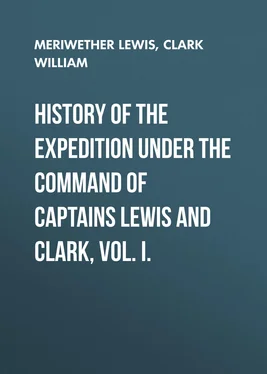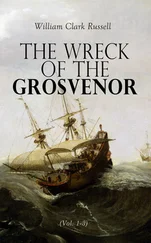William Clark - History of the Expedition under the Command of Captains Lewis and Clark, Vol. I.
Здесь есть возможность читать онлайн «William Clark - History of the Expedition under the Command of Captains Lewis and Clark, Vol. I.» — ознакомительный отрывок электронной книги совершенно бесплатно, а после прочтения отрывка купить полную версию. В некоторых случаях можно слушать аудио, скачать через торрент в формате fb2 и присутствует краткое содержание. Жанр: Путешествия и география, История, foreign_edu, foreign_antique, foreign_prose, на английском языке. Описание произведения, (предисловие) а так же отзывы посетителей доступны на портале библиотеки ЛибКат.
- Название:History of the Expedition under the Command of Captains Lewis and Clark, Vol. I.
- Автор:
- Жанр:
- Год:неизвестен
- ISBN:нет данных
- Рейтинг книги:5 / 5. Голосов: 1
-
Избранное:Добавить в избранное
- Отзывы:
-
Ваша оценка:
- 100
- 1
- 2
- 3
- 4
- 5
History of the Expedition under the Command of Captains Lewis and Clark, Vol. I.: краткое содержание, описание и аннотация
Предлагаем к чтению аннотацию, описание, краткое содержание или предисловие (зависит от того, что написал сам автор книги «History of the Expedition under the Command of Captains Lewis and Clark, Vol. I.»). Если вы не нашли необходимую информацию о книге — напишите в комментариях, мы постараемся отыскать её.
History of the Expedition under the Command of Captains Lewis and Clark, Vol. I. — читать онлайн ознакомительный отрывок
Ниже представлен текст книги, разбитый по страницам. Система сохранения места последней прочитанной страницы, позволяет с удобством читать онлайн бесплатно книгу «History of the Expedition under the Command of Captains Lewis and Clark, Vol. I.», без необходимости каждый раз заново искать на чём Вы остановились. Поставьте закладку, и сможете в любой момент перейти на страницу, на которой закончили чтение.
Интервал:
Закладка:
Sunday, 14th. We set out in the rain which continued during the day. At five miles we came to a creek on the south, about fifteen yards wide, and named by us Piaheto or Eagle's Feather, in honour of the third chief of the Ricaras. After dinner we stopped on a sandbar, and executed the sentence of a court martial which inflicted corporal punishment on one of the soldiers. This operation affected the Indian chief very sensibly, for he cried aloud during the punishment: we explained the offence and the reasons of it. He acknowledged that examples were necessary, and that he himself had given them by punishing with death; but his nation never whipped even children from their birth. After this we continued with the wind from the northeast, and at the distance of twelve miles, encamped in a cove of the southern bank. Immediately opposite our camp on the north side are the ruins of an ancient fortification, the greater part of which is washed into the river: nor could we distinguish more than that the walls were eight or ten feet high. The evening is wet and disagreeable, and the river which is somewhat wider than yesterday, continues to have an unusual quantity of timber. The country was level on both sides in the morning, but afterwards we passed some black bluffs on the south.
Monday, 15th. We stopped at three miles on the north a little above a camp of Ricaras who are hunting, where we were visited by about thirty Indians. They came over in their skin canoes, bringing us meat, for which we returned them beads and fishhooks. About a mile higher we found another encampment of Ricaras on the south, consisting of eight lodges: here we again ate and exchanged a few presents. As we went we discerned numbers of other Indians on both sides of the river; and at about nine miles we came to a creek on the south, where we saw many high hills resembling a house with a slanting roof; and a little below the creek an old village of the Sharha or Chayenne Indians. The morning had been cloudy, but the evening became pleasant, the wind from the northeast, and at sunset we halted, after coming ten miles over several sandbars and points, above a camp of ten Ricara lodges on the north side. We visited their camp, and smoked and eat with several of them; they all appeared kind and pleased with our attentions, and the fair sex received our men with more than hospitality. York was here again an object of astonishment; the children would follow him constantly, and if he chanced to turn towards them, run with great terror. The country of to-day is generally low and covered with timber on both sides, though in the morning we passed some barren hills on the south.
Tuesday, 16th. At this camp the squaw who accompanied the chief left us; two others were very anxious to go on with us. Just above our camp we passed a circular work or fort where the Sharha or Chayennes formerly lived: and a short distance beyond, a creek which we called Chayenne creek. At two miles is a willow island with a large sandbar on both sides above it, and a creek, both on the south, which we called Sohaweh, the Ricara name for girl; and two miles above a second creek, to which we gave the name of Chapawt, which means woman in the same language. Three miles further is an island situated in a bend to the north, about a mile and a half long, and covered with cottonwood. At the lower end of this island comes in a small creek from the north, called Keetooshsahawna or Place of Beaver. At the upper extremity of the island a river empties itself from the north: it is called Warreconne, or Elk Shed their Horns, and is about thirty-five yards wide: the island itself is named Carp island by Evans, a former traveller. As we proceeded there were great numbers of goats on the banks of the river, and we soon after saw large flocks of them in the water: they had been gradually driven into the river by the Indians who now lined the shore so as to prevent their escape, and were firing on them, while sometimes boys went into the river and killed them with sticks: they seemed to be very successful, for we counted fifty-eight which they had killed. We ourselves killed some, and then passing the lodges to which these Indians belonged, encamped at the distance of half a mile on the south, having made fourteen and a half miles. We were soon visited by numbers of these Ricaras, who crossed the river hallooing and singing: two of them then returned for some goats' flesh and buffaloe meat dried and fresh, with which they made a feast that lasted till late at night, and caused much music and merriment.
Wednesday 17th. The weather was pleasant: we passed a low ground covered with small timber on the south, and barren hills on the north which come close to the river; the wind from the northwest then become so strong that we could not move after ten o'clock, until late in the afternoon, when we were forced to use the towline, and we therefore made only six miles. We all went out hunting and examining the country. The goats, of which we see large flocks coming to the north bank of the river, spend the summer, says Mr. Gravelines, in the plains east of the Missouri, and at the present season are returning to the Black mountains, where they subsist on leaves and shrubbery during the winter, and resume their migrations in the spring. We also saw buffaloe, elk, and deer, and a number of snakes; a beaver house too was seen, and we caught a whippoorwill of a small and uncommon kind: the leaves are fast falling; the river wider than usual and full of sandbars: and on the sides of the hills are large stones, and some rock of a brownish colour in the southern bend below us. Our latitude by observation was 46° 23' 57".
Thursday 18. After three miles we reached the mouth of Le Boulet or Cannonball river: this stream rises in the Black mountains, and falls into the Missouri on the south; its channel is about one hundred and forty yards wide, though the water is now confined within forty, and its name is derived from the numbers of perfectly round large stones on the shore and in the bluffs just above. We here met with two Frenchmen in the employ of Mr. Gravelines, who had been robbed by the Mandans of their traps, furs, and other articles, and were descending the river in a periogue, but they turned back with us in expectation of obtaining redress through our means. At eight miles is a creek on the north, about twenty-eight yards wide, rising in the northeast, and called Chewah or Fish river; one mile above this is another creek on the south: we encamped on a sandbar to the south, at the distance of thirteen miles, all of which we had made with oars and poles. Great numbers of goats are crossing the river and directing their course to the westward; we also saw a herd of buffaloe and of elk; a pelican too was killed, and six fallow deer, having found, as the Ricaras informed us, that there are none of the black-tail species as high up as this place. The country is in general level and fine, with broken short high grounds, low timbered mounds on the river, and a rugged range of hills at a distance.
Friday 19. We set sail with a fine morning, and a southeast wind, and at two and a half miles passed a creek on the north side: at eleven and a half miles we came to a lake or large pond on the same side, in which were some swans. On both banks of the Missouri are low grounds which have much more timber than lower down the river: the hills are at one or two miles distance from the banks, and the streams which rise in them are brackish, and the mineral salts appear on the sides of the hills and edges of the runs. In walking along the shore we counted fifty-two herds of buffaloe, and three of elk, at a single view. Besides these we also observed elk, deer, pelicans, and wolves. After seventeen and a half miles we encamped on the north, opposite to the uppermost of a number of round hills, forming a cone at the top, one being about ninety, another sixty feet in height, and some of less elevation. Our chief tells us that the calumet bird lives in the holes formed by the filtration of the water from the top of these hills through the sides. Near to one of these moles, on a point of a hill ninety feet above the plain, are the remains of an old village which is high, strong, and has been fortified; this our chief tells us is the remains of one of the Mandan villages, and are the first ruins which we have seen of that nation in ascending the Missouri: opposite to our camp is a deep bend to the south, at the extremity of which is a pond.
Читать дальшеИнтервал:
Закладка:
Похожие книги на «History of the Expedition under the Command of Captains Lewis and Clark, Vol. I.»
Представляем Вашему вниманию похожие книги на «History of the Expedition under the Command of Captains Lewis and Clark, Vol. I.» списком для выбора. Мы отобрали схожую по названию и смыслу литературу в надежде предоставить читателям больше вариантов отыскать новые, интересные, ещё непрочитанные произведения.
Обсуждение, отзывы о книге «History of the Expedition under the Command of Captains Lewis and Clark, Vol. I.» и просто собственные мнения читателей. Оставьте ваши комментарии, напишите, что Вы думаете о произведении, его смысле или главных героях. Укажите что конкретно понравилось, а что нет, и почему Вы так считаете.












